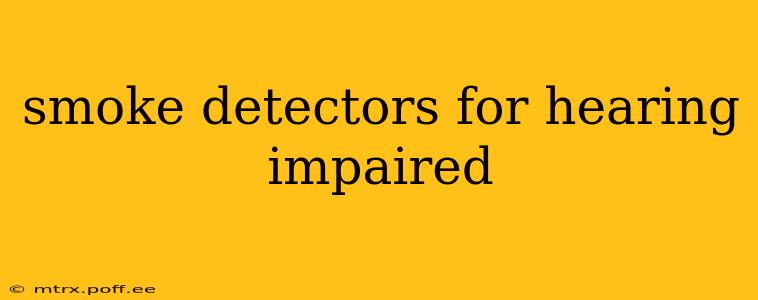For individuals with hearing impairments, the traditional sound-only smoke alarm presents a significant safety challenge. A fire's early warning signs, crucial for timely evacuation, can easily be missed. Fortunately, advancements in technology have led to the development of smoke detectors specifically designed to accommodate the needs of the hearing impaired, ensuring a safer home environment. This comprehensive guide explores various options and considerations for choosing the right smoke detector for your specific needs.
What are the Best Smoke Detectors for the Hearing Impaired?
The best smoke detectors for the hearing impaired prioritize multiple alert methods beyond just sound. These often include:
-
Bright flashing lights: A strobe light is a highly effective visual alarm, particularly useful in low-light conditions or for individuals who are profoundly deaf. The intensity and frequency of flashing should be robust enough to be easily seen even from a distance or through sleep.
-
Vibrating pads or pillows: These devices connect to the smoke alarm and provide a tactile alert, directly waking the user through physical sensation. This is an excellent alternative or supplement to flashing lights.
-
Bed shakers: Similar to vibrating pads, bed shakers offer a stronger vibration, ideal for individuals who sleep deeply or have reduced tactile sensitivity.
-
Wireless interconnectivity: Many modern smoke alarm systems offer wireless interconnectivity. This ensures that if one alarm detects smoke, all connected alarms will trigger both audible and visual/vibrational alerts throughout the home.
What are the Different Types of Smoke Detectors for the Hearing Impaired?
While the core function remains the same—detecting smoke—several types cater to different needs and preferences:
-
Photoelectric smoke detectors: These are sensitive to smoldering fires, which produce larger quantities of smoke particles. They are generally recommended for bedrooms.
-
Ionization smoke detectors: These are better at detecting fast-flaming fires, producing more smaller particles. They are often suitable for other areas of the house.
-
Dual-sensor smoke detectors: These combine both photoelectric and ionization sensors for broader coverage and protection against various fire types. This is often considered the best all-around option.
What Features Should I Look For in a Smoke Detector for the Hearing Impaired?
Beyond the basic alert methods, consider these additional features:
-
Battery backup: Ensure your smoke detector has a reliable battery backup in case of power outages.
-
Low-battery warning: A clear and readily visible warning signal will prevent false alarms or unexpected failures.
-
Easy installation and maintenance: Choose a system that is user-friendly to install and maintain, particularly if you have mobility limitations.
-
Certifications and standards: Look for detectors that meet relevant safety and accessibility standards.
How Do I Choose the Right Smoke Detector for My Needs?
Selecting the right smoke detector requires careful consideration of your individual needs and circumstances. Factors to consider include:
-
Level of hearing impairment: Individuals with mild hearing loss may only require visual alerts, while those with profound deafness may need a combination of visual and tactile alerts.
-
Sleeping habits: Individuals who are deep sleepers may benefit from a bed shaker or stronger vibrating pad.
-
Home layout: Consider the placement of smoke detectors to ensure optimal coverage and alert reach.
How Much Do Smoke Detectors for the Hearing Impaired Cost?
The cost varies depending on features and brand. Basic smoke detectors with flashing lights might be relatively inexpensive, while more advanced systems with multiple alert methods and wireless interconnectivity can be more costly. However, the investment in safety and peace of mind is invaluable.
Are There Any Government Programs or Subsidies Available to Help with the Cost of Smoke Detectors for the Hearing Impaired?
Availability of government programs or subsidies varies by location. It's advisable to check with your local fire department, disability services, or relevant government agencies to inquire about potential assistance programs in your area.
Where Can I Buy Smoke Detectors for the Hearing Impaired?
Many home improvement stores, online retailers, and medical supply stores sell smoke detectors, including those designed for individuals with hearing impairments. Research different brands and compare features before purchasing.
This information should help you make informed decisions about smoke detector selection to create a safer and more secure living environment. Remember, early detection is vital, and choosing the right equipment is a crucial step in protecting yourself and your loved ones.
